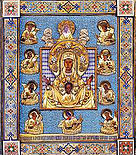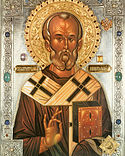BISHOP ANDREI’S PASCHAL EPISTLE
Christ is Risen!
Beloved in the Lord fathers, brothers and sisters,
Great Lent, a time of ascetic struggles, symbolizes our earthly life, full of sorrows. Then comes Passion Week, when we follow Christ to Golgotha. And finally, comes the joyous Pascha, the image of eternal life in the Kingdom of Heaven, “the beginning of another life eternal” (Paschal Canon, Ode 7).
At Paschal Matins, the Catechetical Homily of St. John Chrysostom is always read. In this Homily, St. John is based on the Gospel parable of our Lord Jesus Christ about the workers in the vineyard (Matt. 20:1-16).
Early in the morning, the master of the vineyard hired workers for his vineyard for one denarius. Then, at the 3rd hour (i.e. at 9 o’clock in the morning) he brought new workers into the vineyard, and he did the same at the 6th and 9th hours. Finally, the last workers were called to the vineyard at the 11th hour (i.e., at 5 p.m.), just an hour before the end of the working day. When the time came for payment, the generous master paid everyone one denarius, both the first and the last.
The vineyard is the Church, the Master of the vineyard is our Lord Jesus Christ.
St. John Chrysostom, following the Gospel parable, depicts the feat of Great Lent as labour in the vineyard of Christ. Some laboured from the very beginning of Lent, others, less diligent, fasted less. But all received an equal reward on the night of Pascha.
St. John says in his Homily:
“If any have laboured long in fasting, let him how receive his recompense. If any have toiled from the first hour, let him today receive his just reward. If any have come at the third hour, let him with thankfulness keep the feast. If any have arrived at the sixth hour, let him in no wise be in doubt, for in no wise shall he suffer loss… For the Lord is gracious and receives the last even as the first; He gives rest unto him who comes at the eleventh hour, even as unto him who toiled from the first hour.”
What reward does the gracious Lord offer to those who have laboured? St. John continues:
“Therefore, enter ye all into the joy of your Lord; first and last alike, receive your reward… The table is full-laden; feast ye all sumptuously. The calf is fatted; let no one go hungry away; enjoy ye all the feast of faith…”
“The calf is fatted” – St John refers here to the Gospel parable of the Prodigal Son. When he returned, his father ordered a fatted calf to be slaughtered for him.
When an animal is being prepared for slaughter, it is separated from the herd and fed intensively to fatten up by the appointed day. The fatted calf is the Lord Jesus Christ, the unblemished Lamb foreordained for slaughter before the foundation of the world (1 Peter 1:20).
Before all ages, in the council of the Holy Trinity, it was determined that the Son of God must become incarnate and be sacrificed for the salvation of men. Even before the creation of the world, it was determined that believers in Christ would eat His Body and drink His Blood. This is what St. John Chrysostom calls us to on Paschal night, saying: “The calf is fattened, let no one go hungry away.”
The Lord gives the same and equal reward to all those who labour for Him. He offers us Himself – God, Who was incarnate, crucified and is risen for our sake.
In return, let us give ourselves to Him as an offering, for He will not be satisfied with anything less than this. “My son, give me your heart” (Proverbs 23:26), says the Lord to each of us.
When the master of the vineyard from the Gospel parable asked the workers of the 11th hour why they stood idle in the marketplace all day, they answered: “No one hired us” (Matt. 20:7).
Until the Lord calls a man into His Church, he stands idle in the marketplace of this world. No matter how varied his worldly activities may be, they are useless for eternity. In the eyes of God, such activity is the same as idleness.
An unbeliever does not believe in a future life and imagines that his existence is limited only to this earthly life, and at the same time he does not know what to use it for. It happens that a person is terminally ill, his time is very short. And he, waiting for the end, spends the remaining hours in empty entertainment. “No one hired us.”
Why is there so much unbelief in the world? Because iniquity has abounded among the people. The Lord says in the Gospel about the last times: “And because iniquity will abound, the love of many will grow cold” (Math. 24:12). And love of God and faith in Him are inseparable.
The Apostle Paul writes to his disciple Timothy what ministers of the Church should be like: “Those who hold the mystery of the faith in a pure conscience” (1 Tim. 3:9). Faith is a mystery, i.e. something miraculous, incomprehensible. Faith is a mysterious union of the soul with God. Faith is a mysterious vision of the heart that can penetrate beyond the material world. The mystery of faith cannot dwell in an impure heart and a wicked conscience.
Let us make our main task in this age of unbelief to keep the faith, for which we must first of all preserve the purity of our conscience.
Amen.
I congratulate all of you on the great feast of Pascha.
Christ is Risen!
Bishop Andrei
Melbourne. Pascha 2025

